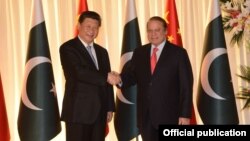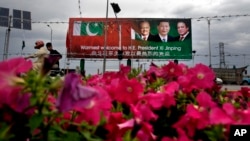China’s President arrived in Pakistan on Monday for a two-day visit. President Xi Jinping and Pakistani Prime Minister Nawaz Sharif held talks on trade and other issues in the capital, Islamabad. The two sides signed agreements for $46 billion of investments in energy and infrastructure projects. Chinese and Pakistani officials were also set to talk about action against militancy and unrest in Afghanistan.
Before Mr. Xi’s arrival, Pakistani state television broadcast programs praising Pakistan’s friendship with China. Six Pakistani fighter jets followed the president’s airplane as it entered Pakistani airspace.
During his visit, the Chinese leader is to receive Pakistan’s highest civilian award, the Nishan-e-Pakistan. He will also speak to Pakistan’s parliament.
Pakistan has called China its “all weather” friend. Some observers accuse the United States, a major foreign donor and ally of Pakistan, of basing its relationship on individual issues and actions.
President Xi is traveling with his wife, Madam Peng Liyuan, top Chinese ministers and Communist Party officials. Chinese business leaders are also in Pakistan.
Both countries want to discuss the China Pakistan Economic Corridor during the visit. The corridor is a system of roads, railroads, and gas and oil pipelines linking southwestern China to the Pakistani port of Gwadar. China wants to renew the ancient Silk Road. The goal is to expand road and sea links between southwest Asia and China from the time of the Han Dynasty.
Pakistan’s adviser on the economy, Sartaj Aziz, hopes new investments from China will help Pakistan’s economy.
“So this investment over an 8-10 year period of $4 billion a year, would certainly step up the investment rate, GDP ration as well as growth rate, which has somehow stagnated between three and four percent for the last seven, eight years.”
China to discuss security concerns with Pakistan
However, problems with security are a big concern. Separatist fighters in Pakistan’s Baluchistan province and Islamist militants in other areas have hurt development. Even President Xi’s trip was affected. It was supposed to have happened last year but was postponed because of security concerns over anti-government protests.
China’s ambassador to Pakistan, Sun Weidong, has noted increased cooperation between the two countries. He told Chinese state television that his country has established a joint agreement with Pakistan to protect their interests. He said that Pakistan will set up a special military force to protect Chinese workers. And it plans to support projects linked to the economic corridor.
President Xi is expected to discuss the Chinese government’s concerns about Muslim separatists in the Xinjiang area. China is concerned that militants are receiving training and support from Pakistan’s lawless tribal areas.
The Chinese leader will also meet with Pakistan’s military leadership. The meeting is expected to include a discussion of military operations in Pakistan’s tribal areas. It also will likely include discussions about security in neighboring Afghanistan.
I’m Mario Ritter.
VOA’s Ayesha Tanzeem reported on this story from Islamabad. Mario Ritter wrote it for VOA Learning English. George Grow was the editor.
_____________________________________________________________
Words in This Story
infrastructure – n. the basic equipment and structures, such as roads, bridges or ports, that are needed by a country, area or organization
corridor – n. a narrow area of land used for something such as transportation or trade
donor – n. a person, group or country that gives something, such as money or food, in order to help another person, group or country
tribal – adj. relating to a tribe, a closely linked group of people






